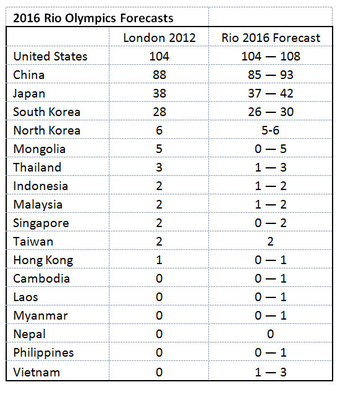By Marcus Noland, Non-resident Senior Fellow with the East-West Center and Executive Vice President and Director of Studies at the Peterson Institute for International Economics.
From their European aristocratic origins, the modern Olympic Games have grown to be the most global organized sporting event on earth, with more than 10,000 competitors from over 200 national delegations participating. As a result, a small cottage industry has developed modeling national medal performance at the Olympics as a function of such factors as population size, income and women's labor force participation, to name a few.
In light of these socio-economic correlates, it's not surprising that Asia's rise over the last century has been paralleled by the region's growing success at the Olympic Games. In 1912, Japan became the first Asian country to make an appearance at the Games, followed by the Philippines in 1924 and Burma (Myanmar), China, Singapore, and South Korea in 1948. In the post-War period, Asian athletic prowess continued to rise along with the region's growing economic power. Since the early 1980s, Asian competitors have made up roughly 11 to 15 percent of the total participating athletes at the Summer Games, and between 7 and 12 percent at the Winter Games.
Asian competitors have achieved even greater success in reaching the medal stand: in 1984 Asian athletes at the Los Angeles Summer Games accounted for 12 percent of all medals and 14 percent of gold medals, but by 2008 they seized 19 percent of total medals and 27 percent of the gold. The improvement is even more striking in the Winter Games, with Asian athletes going from earning only a single medal in 1988 to a peak of 30 in 2010.
Asian female athletes in particular have made enormous strides from the first post-War Games, when only a single woman from an Asian country (South Korea) competed athletically at London 1948. Indeed, there is evidence that with Asian male athletes underperforming in Olympic competition, Asian success is now driven by the region's female competitors.
At the soon-to-open Rio Games, models indicate that the United States is likely to earn the greatest number of medals overall, but China is closing the gap. Japan and South Korea may well pick up a few more medals to remain in the top 10, and Northeast Asia as a whole is likely to continue to dominate medaling by Asian delegations. Meanwhile, some Southeast Asian countries may medal for the first time.
The U.S., China, and other countries competitive in women's track and field should benefit from the ban of the Russia athletics squad from Rio over the state-sponsored doping scandal. Unfortunately, doping, particularly as practiced East Germany in the 1970s and '80s, and Russia at the London and Sochi Games, has distorted the historical record of competition. Our models explicitly take this history into account.
Missing data preclude generating a true forecast for North Korea, but the country has recently put success in international sport competitions at the center of a propaganda campaign. The regime has put a general in charge of the sports program, hired some former East German coaches, and is promising to compete with "heated zeal." As leader Kim Jong-un put it: "Sports officials and coaches must implement the tactics of anti-Japanese guerilla-style attacks in each sport event in order to take the initiative in every game and triumph." Expect North Korea to garner 5-6 medals in Rio and an unknown number of doping violations. If North Korea comes away with say 8 or 9 medals, well, maybe those guerilla tactics are working.
Several imponderables could confound the forecasts. The first is the zika virus, which has discouraged some athletes from participating. Worse, some athletes could conceivably contract zika and be unable to compete, at least at their full potential.
Another issue is the impact of home field advantage. Historically, the host of the Games has experienced a statistically significant performance boost. But this year there is reason to believe that Brazil may not obtain the full effect, since the country is experiencing political and economic turmoil. The impeachment trial of President Dilma Rousseff is expected to extend into the Games, creating protocol issues such as who should preside as host, and raising the specter of mass protests during the competition.
The crisis could adversely affect the performance of Brazilian athletes by disrupting their training, or just creating an unwelcome distraction. (Though one could argue the opposite case: the Brazilians are inured to the chaos, and it will be the visiting foreigners who are thrown off balance.) If Brazil is unable to make full use of the home field advantage, China, Japan, and South Korea would be the most likely Asian beneficiaries of Brazil's woes.
Under some forecasting approaches, a few countries that won no medals at London, including Cambodia, Laos, Myanmar, the Philippines, and Vietnam, are predicted to win a single medal each. If Cambodia, Laos or Myanmar were to medal, it will be for their first time in Olympic history.
##
The EAST-WEST CENTER promotes better relations and understanding among the people and nations of the United States, Asia, and the Pacific through cooperative study, research, and dialogue. Established by the U.S. Congress in 1960, the Center serves as a resource for information and analysis on critical issues of common concern, bringing people together to exchange views, build expertise, and develop policy options.

